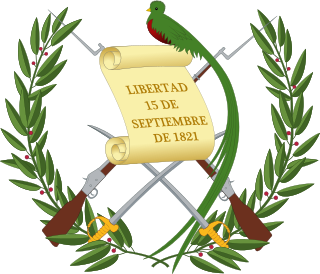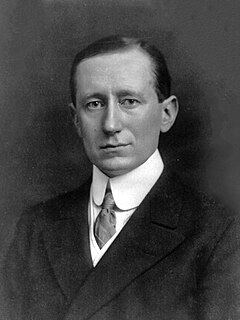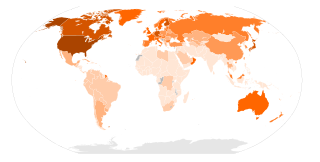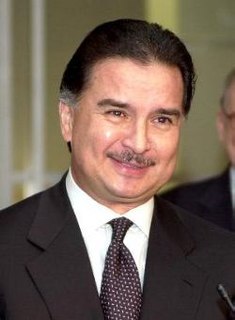
Politics of Guatemala takes place in a framework of a presidential representative democratic republic, where by the President of Guatemala is both head of state, head of government, and of a multi-party system. Executive power is exercised by the government. Legislative power is vested in both the government and the Congress of the Republic. The judiciary is independent of the executive and the legislature.

XEW-AM is a radio station in Mexico City, Mexico, broadcasting on the AM frequency of 900 kHz; it is branded as W Radio. XEW-AM serves as the originating station for other "W-Radio" stations around Mexico that carry some of its programs. The programming on XEW-AM is also simulcast on Mexico City FM radio station 96.9 XEW-FM.

It is generally recognised that the first radio transmission was made from a temporary station set up by Guglielmo Marconi in 1895. This followed on from pioneering work in the field by a number of people including Alessandro Volta, André-Marie Ampère, Georg Ohm and James Clerk Maxwell.

TV Azteca, S.A.B. de C.V. is a Mexican multimedia conglomerate owned by Grupo Salinas. It is the second-largest mass media company in Mexico after Televisa. It primarily competes with Televisa and Imagen Televisión, as well as some local operators. It owns two national television networks, Azteca Uno and Azteca 7, and operates two other nationally distributed services, adn40 and a+. All three of these networks have transmitters in most major and minor cities.

José Rafael Carrera Turcios was the president of Guatemala from 1844 to 1848 and from 1851 until his death in 1865, after being appointed President for Life in 1854. During his military career and presidency, new nations in Central America were facing numerous problems: William Walker's invasions, liberal attempts to overthrow the Catholic Church and aristocrats' power, the Civil War in the United States, Mayan uprising in the east, Belize boundary dispute with England, and the wars in Mexico under Benito Juarez. This led to a rise of caudillos, a term that refers to charismatic populist leaders among the indigenous people. Many regional and national caudillos were interested in power for their own gain. Carrera was an exception as he genuinely took the interests of Guatemala's Indian majority to heart.
Commercial broadcasting is the broadcasting of television programs and radio programming by privately owned corporate media, as opposed to state sponsorship. It was the United States′ first model of radio during the 1920s, in contrast with the public television model in Europe during the 1930s, 1940s and 1950s which prevailed worldwide until the 1980s.

The geographical usage of television varies around the world with a number of different transmission standards in use and differing approaches by government in relation to ownership and programme content.
XHDF-TDT is the over-the-air Azteca Uno network flagship station in Mexico City. Azteca 13 can be seen in most major cities in Mexico through TV Azteca's owned-and-operated transmitter network. XHDF provides HD programming to other transmitters and cable and satellite viewers. Azteca 13 can also be seen on DirecTV in Latin America. Azteca 13 also provides the United States Azteca America network with programming which sometimes can be seen simultaneously.

Mass media are the means through which information is transmitted to a large audience. This includes newspapers, television, radio, and more recently the Internet. Those who provide news and information, and the outlets for which they work, are known as the news media.

Enlace is a Latin American Christian-based broadcast television network. Enlace provides Inspirational Christian programming to the Hispanic community. The network features culturally relevant, faith-based programming to Hispanics of all age groups. Enlace's primary headquarters are in San José, Costa Rica. In addition, Enlace owns and operates studios, offices, and call centers in most Latin American countries.

KXEW is a commercial radio station located in South Tucson, Arizona, broadcasting to the Tucson, Arizona, area on 1600 AM. KXEW airs a tejano music format branded as "Radio Tejano". The station is currently owned by iHeartMedia, Inc.. Its studios are located north of downtown Tucson along Oracle Road, while the transmitter site is in South Tucson.

General elections were held in Guatemala on 3 November 1985, with a second round of the presidential elections taking place on 8 December. The presidential election resulted in a victory for Vinicio Cerezo, who had received $650,000 towards his campaign from media owner Remigio Ángel González. The Congressional elections resulted in a victory for Cerezo's Guatemalan Christian Democracy, which won 51 of the 100 seats. Voter turnout was 69.3%.

General elections were held in Guatemala on 7 November 1999, with a second round of the presidential elections on 26 December. Alfonso Portillo won the presidential elections, whilst his Guatemalan Republican Front also won the Congressional elections. Voter turnout was 53.8% on 7 November and 40.4% on 26 December.
Media of Latin America includes a range of media groups across television, radio and the press. Pan-Latin American television networks include the US-based CNN en Español, Univision, and MundoVision, as well as Spain's Canal 24 Horas. In 2005 TeleSUR, headquartered in Caracas, Venezuela, was launched with the support of regional governments, with the objective of providing information to promote the integration of Latin America. and as a counterweight to existing large international media.
Media cross-ownership is the common ownership of multiple media sources by a single person or corporate entity. Media sources can include broadcast and cable television, film, radio, newspaper, magazine, book publishing, music, video games, and various online entities. In the United States, a recent increase in media merging and concentration of ownership has correlated with a decrease in trust in mass media.

Guatemala–Mexico relations refers to the historical and current bilateral relationship between Guatemala and Mexico. Both nations are members of the Association of Caribbean States, Community of Latin American and Caribbean States, Organization of American States, Organization of Ibero-American States and the United Nations.














